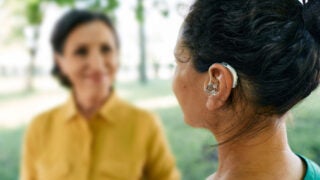
Teens ages 13-18 and their parents are addicted to smartphones and digital devices, according to a USC study. (Photo/iStock)
Addicted to your smartphone? Half of teens in U.S. and Japan say they are
First study to compare data from both nations reveals teenagers and parents feel distracted and anxious due to device use.
Many teens and their parents agree that digital devices are a source of concern, anxiety and conflict, according to a study from the USC Annenberg School for Communication and Journalism released today.
The study, “The New Normal: Parents, Teens and Digital Devices,” is based on a on a comprehensive survey of 1,200 teens and parents. Conducted in April, it is the first such study of teens and families in Japan, where 90 percent of parents and teens own a smartphone, and the first to compare those insights to existing U.S. data from Common Sense Media on digital media use among families in North America.
The study found that most parents of children ages 13-18 felt their teens were addicted to mobile devices, and many parents felt addicted themselves. In both countries, one in three teens thought their parents were addicted to their mobile devices.
“Advances in digital media and mobile devices are changing the way we engage not only with the world around us, but also with the people who are the closest to us,” said Willow Bay, dean of USC Annenberg. “These shifts are happening faster and more dramatically than any change in recent history.
“To truly understand their impact on our relationships, we needed to dig deeper into the media habits and attitudes of parents and teens.”
In addition to tracking addiction, distraction and conflict, the study explored the potential benefits of device use, as well as ubiquity and usage. The trends uncovered in Japan often mirrored the results of two similar 2016 U.S. studies by Common Sense Media. The USC Annenberg study found:
- In both countries, one out of every two teens felt addicted to their devices and the majority of parents agreed that their teens are addicted. Notably, a higher percentage of Japanese parents (38 percent) than American parents (27 percent) felt addicted themselves.
- When asked if their devices are a source of distraction, 72 percent of the American teens surveyed said they felt the need to immediately respond to texts, social-networking messages and other notifications; 48 percent of Japanese teens said they did. Japanese parents and teens were less likely to feel that the other gets distracted by mobile devices than did their U.S. counterparts.
- Digital devices were a greater source of conflict among teens and parents in the U.S. than in Japan: One in three U.S. families reported having an argument every day. More teens in the U.S. also felt that mobile device use has hurt their relationship with their parents; in Japan, more parents felt their family relationships have been hurt by mobile device use.
- Compared to just 25 percent of Japanese parents, most American parents surveyed — 88 percent — had an optimistic view of the benefits of technology in terms of helping their children acquire new skills.
“Our study raises some critical questions about the impact of digital devices in family life,” Bay said. “And while the cultural nuances may vary from country to country, this is clearly a global issue.”



